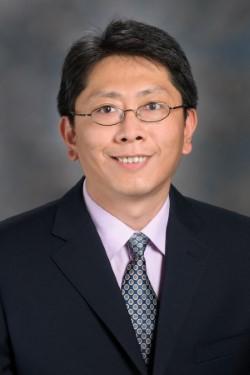Study shows cancers with high levels of the SLC7A11 gene may respond to glucose transporter inhibitor treatment

Credit: The University of Texas MD Anderson Cancer Center
HOUSTON — New findings from researchers at The University of Texas MD Anderson Cancer Center about how some cancer cells become “addicted” to glucose could open up fresh approaches to therapy strategies for cancers with high levels of an amino acid transporter called solute carrier family 7 member 11 (SLC7A11). This includes lung cancer and renal cell carcinoma, the most common type of kidney cancer.
The study, led by Boyi Gan, Ph.D., of the Department of Experimental Radiation Oncology, explored metabolic reprogramming, cancer, and published findings in the March 30 online issue of Nature Cell Biology.
“Metabolic reprogramming often renders cancer cells highly dependent on specific nutrients for survival,” said Gan. “Limiting the supply of such nutrients or blocking their uptake or metabolism through pharmacological means may selectively kill ‘addicted’ cancer cells without affecting normal cells. Our understanding of nutrient dependency in cancer cells can provide great insights for targeting metabolic vulnerabilities in cancer therapies.”
The chemistry behind cancer cell “addictions”
Gan noted the example of asparaginase treatment for acute lymphoblastic leukemia, which, unlike normal cells, lacks the ability to produce the amino acid asparagine, and must depend on extracellular sources to obtain asparagine in order to survive. The treatment disrupts asparagine supply and ensures the cancer cells cannot gain access to this vital amino acid, resulting in cancer cell death.
Cancer cells depend on another amino acid known as cystine to ensure strong antioxidant defenses. Most cancer cells obtain cystine via the SLC7A11 transporter. Once inside cells, cystine is converted to a related amino acid called cysteine, which is then used to build up glutathione, the most common antioxidant produced in the body, which in turn, allows cancer cells to survive.
“SLC7A11 is frequently overexpressed in cancers and has a well-established role in maintaining glutathione levels which reduce cancer cell death,” said Gan. “However, in this study we found that actively importing cystine into cells represents a risky business for cancer cells. Cystine is among the least soluble amino acids and accumulating too much cystine inside cells is toxic. Therefore, cancer cells are forced to quickly convert cystine to cysteine. Consequently, cancer cells with high levels of SLC7A11 and high demand for cystine become dependent on glucose for survival.”
These findings revealed a metabolic vulnerability associated with high SLC7A11 expression in cancer cells, which suggests corresponding therapeutic strategies. The research team showed that therapies known as glucose transporter (GLUT) inhibitors cut off glucose supply, leading to toxic buildup of cystine inside cells. This selectively kills SLC7A11-high cancer cells and suppresses SLC7A11-high tumor growth. This study therefore suggests using GLUT inhibitors to treat tumors with high expression of this key amino acid transporter.
###
MD Anderson study team participants included Xiaoguang Liu, Ph.D.; Yilei Zhang, Ph.D.; Jie Zhang; Hyemin Lee, Ph.D.; Pranavi Koppula; Guang Lei; and Li Zhuang; all of the Department of Experimental Radiation Oncology; Xiaoshan Zhang, M.D., Ph.D.; and Bingliang Fang, M.D., Ph.D.; of the Department of Thoracic and Cardiovascular Surgery; and M. James You, M.D., Ph.D., of the Department of Hematopathology.
Other participating institutions included Kadmon Corporation, New York; the University of California, San Diego; and Baylor College of Medicine, Houston.
The study was funded by the National Institutes of Health (5P50CA070907, R01CA181196, R01CA188652, T32EB009380, U54CA224065, and P30CA016672); Department of Defense (KC180131); the Andrew Sabin Family Fellow Award and Bridge Fund from MD Anderson; the Cancer Prevention and Research Institute of Texas (RP170067); and by the MD Anderson Cancer Center Lung Cancer Moon Shot™. The Moon Shots Program™ is a collaborative effort to accelerate the development of scientific discoveries into clinical advances that save patients’ lives. MD Anderson investigators reported no disclosures.
About MD Anderson
The University of Texas MD Anderson Cancer Center in Houston ranks as one of the world’s most respected centers focused on cancer patient care, research, education and prevention. The institution’s sole mission is to end cancer for patients and their families around the world. MD Anderson is one of only 51 comprehensive cancer centers designated by the National Cancer Institute (NCI). MD Anderson is ranked No.1 for cancer care in U.S. News & World Report’s “Best Hospitals” survey. It has ranked as one of the nation’s top two hospitals for cancer care since the survey began in 1990, and has ranked first 15 times in the last 18 years. MD Anderson receives a cancer center support grant from the NCI of the National Institutes of Health (P30 CA016672).
Media Contact
Ron Gilmore
[email protected]




